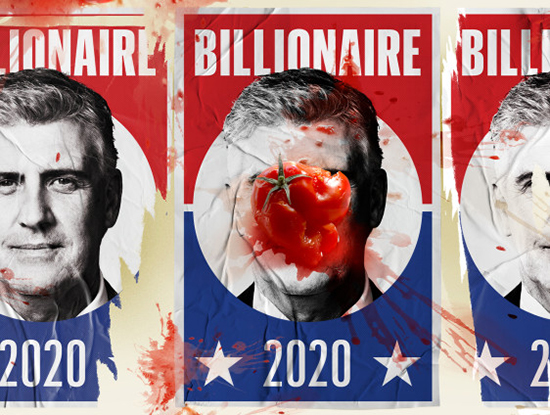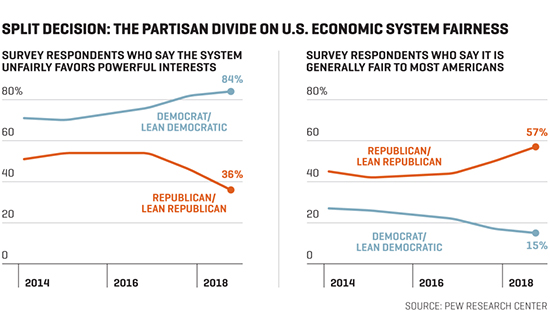
|
美國(guó)人并不仇富,但痛恨不公平,。隨著我們進(jìn)入大選年,,并嘗試?yán)斫饷绹?guó)對(duì)億萬(wàn)富翁愛(ài)恨交加的感情時(shí),這些事實(shí)值得我們?nèi)チ粢?。在這些億萬(wàn)富翁中,,有三位正在競(jìng)選總統(tǒng)。我們有必要了解這種態(tài)度,,因?yàn)閮|萬(wàn)富翁問(wèn)題必然也是下一任總統(tǒng)需要重點(diǎn)處理的問(wèn)題,,而且這個(gè)與誰(shuí)當(dāng)總統(tǒng)無(wú)關(guān)。 這是一個(gè)奇怪的政治時(shí)刻,。在全國(guó)民調(diào)中排名前三的民主黨候選人中,,有兩位,也就是伯尼·桑德斯和伊麗莎白·沃倫,,都會(huì)不時(shí)地在一定程度上將億萬(wàn)富翁描述為萬(wàn)惡之源,。桑德斯曾經(jīng)說(shuō):“我覺(jué)得億萬(wàn)富翁不應(yīng)該存在于世?!迸琶谝坏拿裰鼽h候選人喬·拜登則表達(dá)的更委婉一些,,他在2019年2月說(shuō)道:“我并不羨慕那些能夠賺一百萬(wàn)美元或上億美元的人?!睗撆_(tái)詞就是說(shuō)賺10位數(shù)就有些太不像話了,。然而,民主黨陣營(yíng)還包括兩名億萬(wàn)富翁,,湯姆·斯特爾和新近入圍的邁克爾·布隆伯格,,后者僅用了數(shù)周的時(shí)間便通過(guò)電視廣告的狂轟爛炸將自己推上了前排,與排名第四的候選人佩德·布蒂吉格僅有數(shù)分之差,。 至于共和黨,,他們?cè)谶@個(gè)問(wèn)題上也并非就是上下一條心,盡管其候選人在三年前成為了美國(guó)第一任億萬(wàn)富翁總統(tǒng),。 因此,,人們到底是喜愛(ài)億萬(wàn)富翁還是仇視他們?從黨派來(lái)講這個(gè)問(wèn)題很容易回答。民調(diào)確認(rèn)了我們心中所想:共和黨傾向于交好億萬(wàn)富翁,,而民主黨則相反,。但大量的非黨派因素令這一格局更加復(fù)雜。奧普拉·溫弗瑞,、史蒂芬·斯皮爾伯格,、邁克爾·喬丹,他們都是億萬(wàn)富翁,,而且深受美國(guó)人喜愛(ài),。比爾·蓋茨和沃倫·巴菲特在YouGov的2019年“誰(shuí)是你最敬仰的對(duì)象”調(diào)查中幾乎靠近榜首的位置,其他名列前茅的人士包括電影明星和教皇弗朗西斯,。 有時(shí)候我們喜愛(ài)億萬(wàn)富翁,。但桑德斯和沃倫的成功入圍告訴我們,有很大一部分的美國(guó)民眾對(duì)他們深惡痛絕,。我們?cè)趦|萬(wàn)富翁方面的分歧反映了兩個(gè)完全不同的世界觀:例如世界是如何運(yùn)轉(zhuǎn)的,,為什么一些人走在了前面,而另一些人落在了后面,,未來(lái)是光明還是黑暗,。在過(guò)去幾年中,讓這兩派產(chǎn)生分歧的鴻溝急劇擴(kuò)大,。 |
Americans don’t hate wealth. They hate injustice. Those facts are worth remembering as we enter this election year and try to understand America’s schizoid attitude toward billionaires, three of whom are running for President. It’s an attitude worth understanding because billionaires are certain to symbolize crucial issues for the next President, whoever he or she may be. It’s a bizarre political moment. Two of the top three Democratic candidates in national polling, Bernie Sanders and Elizabeth Warren, routinely vilify billionaires as more or less the root of all evil. Sanders has said, “I don’t think that billionaires should exist.” The top-polling Democrat, Joe Biden, sends a more subtle message: “I don’t begrudge anybody making a million or hundreds of millions of dollars,” he said in February, leaving unspoken that 10 figures are just too much. Yet the Democratic field also includes two billionaires, Tom Steyer and recent entrant Michael Bloomberg, who in only a few weeks has used massive TV advertising to approach the top tier, a few points behind the No. 4 candidate, Pete Buttigieg. As for the Republicans, they’re not entirely unconflicted on this subject, even though their candidate became the first billionaire President three years ago. So do we love billionaires or disdain them? Simple partisanship is the easy part of the answer. Polling confirms what we already know: Republicans tend to be billionaire-friendly, and Democrats tend not to be. What complicates the picture is a large nonpartisan element. Oprah Winfrey, Steven Spielberg, Michael Jordan—they’re all billionaires, and America loves them. Bill Gates and Warren Buffett rank near the top in YouGov’s 2019 survey asking Americans whom they admire most, interspersed among movie stars and Pope Francis. Sometimes we love billionaires. But as the success of Sanders and Warren shows, a sizable group of Americans resent them bitterly. At a deep level, our billionaire bifurcation reflects two starkly different views of the world—how it works, why some people get ahead and others don’t, whether the future is dark or bright. The divide separating those who hold these opposing views has deepened dramatically over the past few years. |

|
不妨看看一些最基本的問(wèn)題:美國(guó)經(jīng)濟(jì)體制是否“對(duì)于大多數(shù)美國(guó)公民是公平的”,或“是否在不公平地支持權(quán)貴的利益”,,皮尤研究中心在過(guò)去五年中一直在就這個(gè)問(wèn)題進(jìn)行調(diào)查,。人們的整體看法基本沒(méi)有變化:約33%的美國(guó)成年人認(rèn)為其是公平的,63%表示它不公平,。但僅僅在過(guò)去三年中,,共和黨和民主黨在這個(gè)問(wèn)題上呈現(xiàn)出極端化態(tài)勢(shì),如今,,共和黨說(shuō)公平的可能性要大得多,,而民主黨則更有可能說(shuō)它不公平。 大家都知道,,億萬(wàn)富翁成為了眾矢之的,。認(rèn)為億萬(wàn)富翁對(duì)美國(guó)有著巨大危害的人不僅僅只是像桑德斯這樣的民主黨社會(huì)主義分子,Cato的調(diào)查顯示54%的民主黨認(rèn)為“億萬(wàn)富翁對(duì)于民主來(lái)說(shuō)是個(gè)威脅”(而79%的共和黨并不贊同這一說(shuō)法),。 這一歷史性轉(zhuǎn)變的推手是收入差距不斷增加的大環(huán)境,。一個(gè)不可避免的事實(shí)在于,自1967年以來(lái),,收入排名前四分之一家庭的通脹調(diào)整后收入增加了99%,,而排名后四分之一的家庭僅增加了31%。共和黨與民主黨則按照各自背道而馳的世界觀,對(duì)這一現(xiàn)象給出了截然不同的解釋,,也導(dǎo)致各自政策建議的矛盾比以往更加尖銳,。 這也讓我們回到了美國(guó)對(duì)億萬(wàn)富翁愛(ài)恨交加的情結(jié)問(wèn)題。在我們所處的超級(jí)黨派環(huán)境中,,即便出現(xiàn)兩個(gè)極端的選舉結(jié)果也是完全合理的,。民主黨熱衷于改革的一派可能會(huì)大獲全勝,他們會(huì)提出了一個(gè)前所未有的反億萬(wàn)富翁主張,,將富人征稅稅率提升至新的歷史高度,。然而選民們還可能給出一個(gè)完全相反但同樣前所未有的選舉結(jié)果:2020年1月,美國(guó)可能會(huì)第二次見(jiàn)證一位來(lái)自于其中一個(gè)黨派的億萬(wàn)富翁入主白宮,。 (財(cái)富中文網(wǎng)) 本文另一版本登載于《財(cái)富》雜志2020年1月刊,,標(biāo)題為《遭鄙視的億萬(wàn)富翁》。 譯者:馮豐 審校:夏林 |
Consider the fundamental question of whether the U.S. economic system “is generally fair to most Americans” or “unfairly favors powerful interests,” as the Pew Research Center has posed it for the past five years. Overall sentiment has barely budged: About 33% of U.S. adults say it’s fair, and 63% say it’s unfair. But in just the past three years, Republicans and Democrats have polarized on the issue, with Republicans now far more likely to say it’s fair, and Democrats far more likely to say it isn’t. Little wonder that billionaires are under fire. It’s no longer just Democratic Socialists like Bernie Sanders who believe they’re profoundly bad for the nation; Cato polling finds that 54% of Democrats believe “billionaires are a threat to democracy” (while 79% of Republicans don’t agree). Underlying this historic shift is the megatrend of increasing income disparity. The inescapable fact is that since 1967, inflation-adjusted income has increased 99% for the top quintile of households and only 31% for the bottom quintile. Republicans and Democrats frame their explanations of what happened in fundamentally different ways based on their rapidly diverging worldviews, leading to ever more sharply contrasting policy prescriptions. Which brings us back to America’s love-hate relationship with billionaires. In our hyperpartisan environment, two extreme election outcomes are entirely plausible. The Democrats’ more progressive wing could sweep, promising an unprecedented anti-billionaire agenda of historic tax increases on the wealthy. Yet voters could also deliver a completely opposite and equally unprecedented outcome: 2020 January, for the second time in U.S. history, a billionaire—of either party—could be taking the oath of office. A version of this article appears in the January 2020 issue of Fortune with the headline “The Great Big Billionaire Backlash.” |






